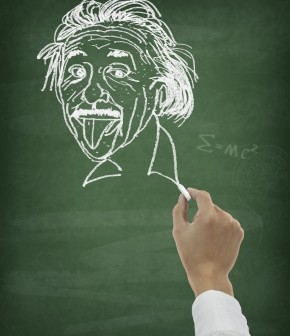Social Theory Explained

Conflict theory states that our society is made up of groups and individuals who struggle and compete over the limited resources and rewards that are available in our society. Resources and rewards oftentimes indicates money, however, that is not necessarily the case in all instances. For example, a valuable resource is education…and there is not enough to go around. Only so many people are accepted to prestigious universities.
Conflict theory focuses on the unequal distribution of power, prestige, and wealth. There is a constant struggle for power, prestige, and wealth in our society. Also note that these do not always go hand-in-hand, however, in most instances wealth brings power and prestige.(Image courtesy of MR LIGHTMAN/FreeDigitalPhotos.net)
This constant struggle shapes our everyday lives, interactions between groups and individuals, is the basis of racial, ethnic, and class inequality, and affects the relations between nations. One of the major concepts behind conflict theory is inequality. Remember functionalists say the unequal distribution is necessary for all positions in society to be filled while conflict theorists say it is inequality and it should not be that way (stratification).
Functionalism is rooted in anthropology. We can look at tribal societies as an example of functionalism. Tribal societies are small self sufficient societies and each member of the society affects the other members as well as the entire group. What are some of the roles/positions within tribal societies? Think about what would happen if one individual or specific group within the tribe decides not to perform their role or dies. How would the others be affected? What effects would it have on the entire group?
There are two types of functions: manifest and latent functions
Manifest functions are specific functions that society, a group, or individuals intend to do. Latent functions are not intended and are a result of manifest functions. In other words, a manifest function is a specifically stated goal of one of our institutions, but due to that function there can be some unintended consequences that occur. For example, (macro perspective) society has specific systems of social control. Society intends to make sure that the groups within the society as well as individuals follow the rules of that society so systems of social control are developed and implemented. From a macro perspective, how do we maintain social control within our society? Do we have laws, police, judicial system, and prisons? The manifest function is to make sure members of society follow the rules or laws; however, there are problems within our criminal justice system. Due to the way the system functions there are unintended consequences (latent functions) such as inequality in the criminal justice system.
Symbolic interactionism focuses on how individuals communicate with one another, the basis of that communication, and the results and consequences of each interaction. Symbolic interactionism focuses on everyday interactions and how people perceive and define events.
Interactionism specifically focuses on the following:
Interactions or face-to-face encounters
o Each interaction has an effect on us and affect any subsequent interactions
We all come in to each interaction with our own perspectives
o It is as if our past comes with us into each interaction
o We all have specific expectations of what should happen in each interaction
Behaviors are a large part of the interactions and how people behave affects each interaction
Symbols or meanings of behaviors
Interpretations: we are constantly interpreting each interaction
o We all interpret situations differently, this is why two people who are part of the same interaction will explain what happened differently
About admin
Teaching Sociology is very enjoyable for me. Sociology is like a gateway to a plethora of knowledge and understanding. The subject material is directly applicable to real-world events and situations found in everyday life. The methods and concepts of sociology yield powerful insights into the social processes shaping the contemporary world. The ability to identify and understand these processes is valuable preparation for professional participation in an ever changing and complex society.Related Posts
Latest News
-
Sociology and the Pursuit of Social Justice: A Compelling Reason to Study It
Sociology is a fascinating field of study that delves into...
- Posted May 31, 2023
- 0
-
The Power of Sociology: Understanding the Importance of Social Structures
Sociology is the scientific study of society, social relationships, and...
- Posted May 31, 2023
- 0
-
FACT FINDING MISSIONS
Life is interleaved with contracts and agreements, the formal and...
- Posted August 10, 2018
- 0
-
The Many Churches of Enhancement
Throughout history religions formed around prophetic doctrines and absorbed people...
- Posted April 6, 2018
- 0
-
TAKE A SECOND TO CONSIDER THE SECOND
Remember that during the late 1700’s when the young US...
- Posted February 21, 2018
- 0
-
WHAT’S ON THE TABLE FOR IMMIGRATION
Deliberating in upcoming months will be a new proposal for...
- Posted February 12, 2018
- 0
-
Time-saving Tips from Your Instructor
Here are some helpful tips: Involve your family/friends. Let them...
- Posted October 19, 2016
- 0
-
Sociology and the Pursuit of Social Justice: A Compelling Reason to Study It
Sociology is a fascinating field of study that delves...
- May 31, 2023
- 0
-
The Power of Sociology: Understanding the Importance of Social Structures
Sociology is the scientific study of society, social relationships,...
- May 31, 2023
- 0
-
FACT FINDING MISSIONS
Life is interleaved with contracts and agreements, the formal...
- August 10, 2018
- 0
-
Successful Families
SUCCESSFUL FAMILIES Balancing Work and Family (dual-earner families) 1.Value...
- June 16, 2011
- 0
-
Sociology of Marriage
Types of “Good” Marriages: Romantic Marriage: passion and sex...
- June 16, 2011
- 0
Sociological Theory
-
Symbolic Interactionism
Symbolic interactionism focuses on how individuals communicate with one another, the basis...








